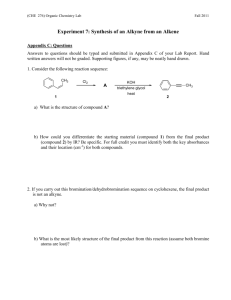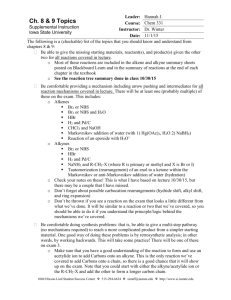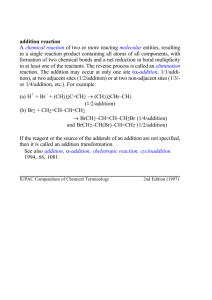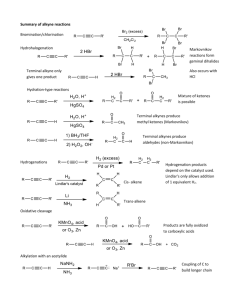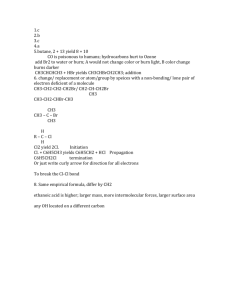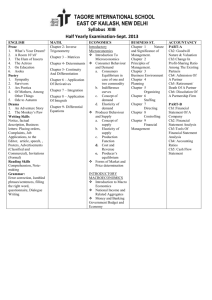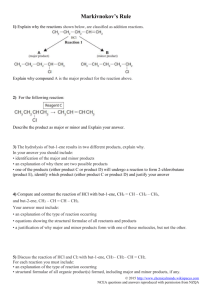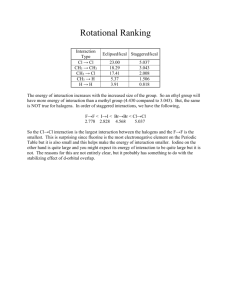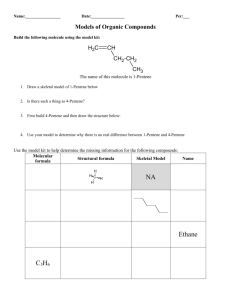Alkynes - OrizontChem.com
advertisement
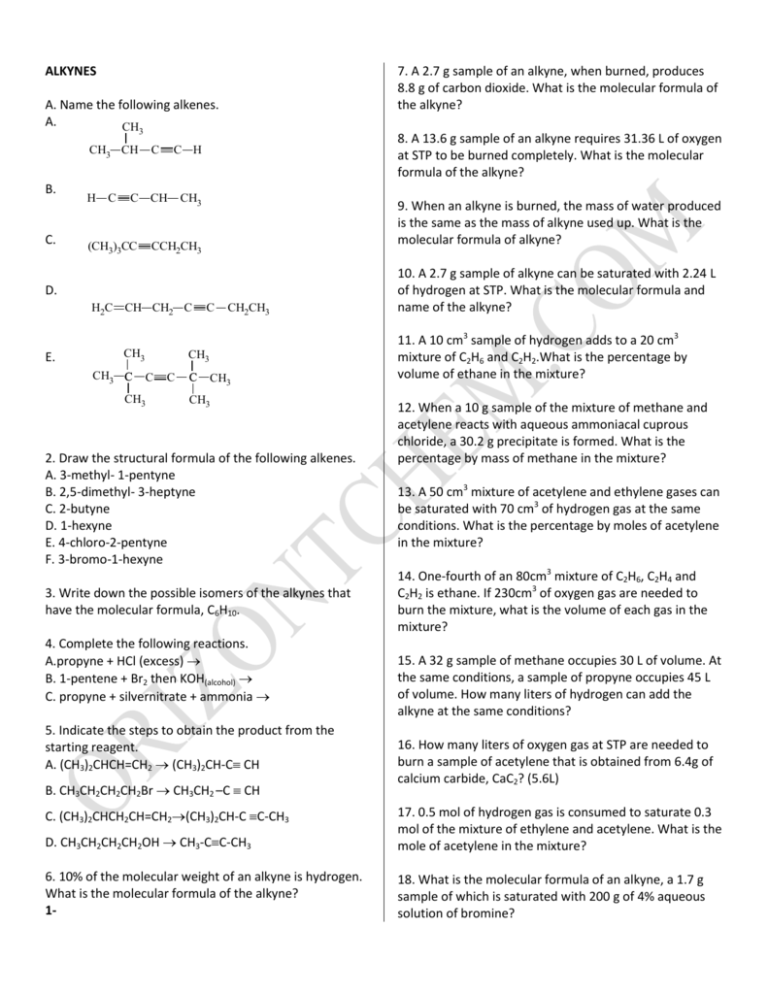
ALKYNES 7. A 2.7 g sample of an alkyne, when burned, produces 8.8 g of carbon dioxide. What is the molecular formula of the alkyne? A. Name the following alkenes. A. CH 3 CH3 CH B. C. H C C C CH (CH3)3CC 8. A 13.6 g sample of an alkyne requires 31.36 L of oxygen at STP to be burned completely. What is the molecular formula of the alkyne? C H CH3 9. When an alkyne is burned, the mass of water produced is the same as the mass of alkyne used up. What is the molecular formula of alkyne? CCH2CH3 D. H2C E. CH CH2 C CH3 CH3 C C CH2CH3 CH3 C CH3 C C CH3 CH3 2. Draw the structural formula of the following alkenes. A. 3-methyl- 1-pentyne B. 2,5-dimethyl- 3-heptyne C. 2-butyne D. 1-hexyne E. 4-chloro-2-pentyne F. 3-bromo-1-hexyne 3. Write down the possible isomers of the alkynes that have the molecular formula, C6H10. 4. Complete the following reactions. A.propyne + HCl (excess) B. 1-pentene + Br2 then KOH(alcohol) C. propyne + silvernitrate + ammonia 5. Indicate the steps to obtain the product from the starting reagent. A. (CH3)2CHCH=CH2 (CH3)2CH-C CH B. CH3CH2CH2CH2Br CH3CH2 –C CH 10. A 2.7 g sample of alkyne can be saturated with 2.24 L of hydrogen at STP. What is the molecular formula and name of the alkyne? 11. A 10 cm3 sample of hydrogen adds to a 20 cm3 mixture of C2H6 and C2H2.What is the percentage by volume of ethane in the mixture? 12. When a 10 g sample of the mixture of methane and acetylene reacts with aqueous ammoniacal cuprous chloride, a 30.2 g precipitate is formed. What is the percentage by mass of methane in the mixture? 13. A 50 cm3 mixture of acetylene and ethylene gases can be saturated with 70 cm3 of hydrogen gas at the same conditions. What is the percentage by moles of acetylene in the mixture? 14. One-fourth of an 80cm3 mixture of C2H6, C2H4 and C2H2 is ethane. If 230cm3 of oxygen gas are needed to burn the mixture, what is the volume of each gas in the mixture? 15. A 32 g sample of methane occupies 30 L of volume. At the same conditions, a sample of propyne occupies 45 L of volume. How many liters of hydrogen can add the alkyne at the same conditions? 16. How many liters of oxygen gas at STP are needed to burn a sample of acetylene that is obtained from 6.4g of calcium carbide, CaC2? (5.6L) D. CH3CH2CH2CH2OH CH3-CC-CH3 17. 0.5 mol of hydrogen gas is consumed to saturate 0.3 mol of the mixture of ethylene and acetylene. What is the mole of acetylene in the mixture? 6. 10% of the molecular weight of an alkyne is hydrogen. What is the molecular formula of the alkyne? 1- 18. What is the molecular formula of an alkyne, a 1.7 g sample of which is saturated with 200 g of 4% aqueous solution of bromine? C. (CH3)2CHCH2CH=CH2(CH3)2CH-C C-CH3 19. The carbondioxide produced by the combustion of 10 g propyne can be absorbed by a 3 L solution of NaOH. What is the molar concentration of NaOH solution? 20. The carbondioxide gas that is produced by the complete combustion of 5.6 L of an alkyne at STP is 30.5 g heavier than the alkyne. Find the molecular formula of the alkyne and write the names and structures of the isomers. 6. I. They are unsaturated hydrocarbons. II. They contain carbon-carbon triple bond. III. The general formula of alkynes is CnH2n+2. Which one(s) is/are correct for alkynes? A. I only B. II only C. I and II D. I and III E. I, II and III MULTIPLE CHOICES 1. Ethylene is the first member of A. alkane B. alkene C. saturated hydrocarbons D. alkyne E. aromatics 2. What is the coefficient of O2 in the combustion reaction of a hydrocarbon having the general formula CnH2n-2? A. n-1 B. (3n-1)/2 C. 3n+1 D. 3n-1 E. (2n-1)/2 3. How many liters of O2 at STP are required to burn C2H2 obtained from 32g of 80% pure CaC2? A. 11.2 B. 22.4 C. 33.6 D. 44.8 E. 67.2 4. Which of the following hydrocarbon produces 16.8 L CO2 when 0.25 mol of it is burned under STP, and 1 mol of it becomes saturated with 2mol of H2? A. CH3-CH=CH2 B. CH3-CH=CHCH3 C. CH3-CCH D. CH2=CH-CH=CH2 E. CH3-CH2-CH3 5. What is the hydrocarbon, which forms a white precipitate with ammonical AgNO3 solution and decolorizes bromine solution? A. CH4 B. C2H6 C. C2H4 D. C2H2 E. C3H6 7. For alkynes; I. Hybrid orbital: sp II. Geometry: linear III. Bond angle: 120 0 Which statement(s) is/are expected to be correct? A. I only B. I and II C. I and III D. II and III E. I, II and III 8. I. C2H2 II. C3H3 III. C4H6 Which of the compounds given above is alkyne? A. I only B. I and II C. I and III D. II and III E. I, II and III 9. How many sigma (σ) and pi () bonds are there in acetylene? A. 2 , 9 σ B. 3 , 8 σ C. 2 , 2 σ D. 3 , 9 σ E. 2 , 3 σ 10. C2H2 + x O2 y CO2 + H2O What can be x and y? A. 2 1 B. 5/2 3/2 C. 5/2 2 D. 7/2 2 E. 4 ½ 11. ClCH2CCH What is the name of the above alkyne? A. 1-chloro ethyne B. 1-chloro propyne C. 2-chloro propyne D. 3-chloro propyne E. chloro ethane 18. 10 moles of O2 are used to burn one mole of an alkyne. What is the formula of the alkyne? A. C7H12 B. C7H14 C. C7H16 D. C5H8 E. C5H10 12. Which of the following is the structural formula of 3-methyl-1-pentyne? A. CH3-CC-CH3 B. H3C–CHCCH C2H5 C. H3C– H2C–CH2CCH D. H3C–C CCCH3 E. H3C–CHCC-CH3 CH3 19. How many moles of acetylene can be prepared at STP by the reaction of 128 g of calcium carbide (CaC2) with excess water? A. 1 B. 2 C. 3 D. 4 E. 5 13. What is the volume of 52 g of acetylene at STP? A. 6.72 L B. 11.2 L C. 22.4 L D. 44.8 L E. 67.2 L 14. How many moles of oxygen are needed to burn 6.8 g of C5H8 at STP? A. 0.4 B. 0.6 C. 7 D. 0.7 E. 2 15. Which of the following hydrocarbons produces a white precipitate when reacted with AgNO3 in NH3 solution? A. C2H4 B. C2H6 C. C3H6 D. C2H2 E. CH4 16. CH3CCH + xH2 Ni Propane What is the coefficient “x” in the given reaction? A. 1 B. 2 C. 5/2 D. 3 E. 4 17. How many molecules of acetylene join together to form benzene when passed through a red hot tube? A. 1 B. 2 C. 3 D. 4 E. 5 20. How many liters of hydrogen at STP are required to saturate 4 g of propyne completely? A. 44.8 B. 4.48 C. 5.6 D. 11.2 E. 22.4 21. Which compound is used in welding? A. C2H2 B. C2H4 C. C3H4 D. C3H6 E. CH4 22. CH3-CC-CH3 + 2HCl X What is the product of the reaction given above? A. 2,3- dichloro butyne B. 2,3- dichloro butane C. 2,2-dichloro butyne D. 2,2-dichloro butane E. 2,2-dichloro butene
